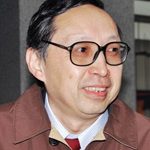
Chen Lai
Dean, Tsinghua Academy of Chinese Learning
Professor, Department of Philosophy, Tsinghua University, PRC
Born in 1952 in Beijing , Professor Chen Lai read geology at the now Central South University and graduated in 1976. He received his master’s and doctoral degrees at Peking University in 1981 and 1985, respectively. Among his teachers were Zhang Dainian and Feng Youlan. Before assuming his current position at Tsinghua University , Professor Chen had taught at Peking University for twenty-eight years. He first started as a lecturer in 1981 and became an associate professor in 1986 and professor in 1990. He was also the chair of the Teaching and Research Office of Chinese Philosophy and the director of the Research Centre for Confucianism at Peking University . Professor Chen is currently the dean of the Tsinghua Academy of Chinese Learning and professor at the Department of Philosophy of Tsinghua University.
A well-known scholar in Confucianism, Professor Chen has held visiting positions in various institutions, including Harvard University (1986-88, 1997, 2006-07), University of Tokyo (1995-96), Kansai University (1999), the Chinese University of Hong Kong (1999-2000), the Hong Kong University of Science and Technology (2002), the City University of Hong Kong (2003), Academia Sinica, Taiwan (2004), and National Central University, Taiwan (2008-09).
Professor Chen is a prolific writer with over twelve academic monographs published, including (all in Chinese) A Study of Zhuxi’s Philosophy (1987 & 2000), Dating of Zhuzi’s Letters (1989), You Wu Zhi Jing : The Spirit of Wang Yangming’s Philosophy (1991), Ancient Religion and Ethics: The Roots of Confucianism (1996), The World of Ancient Thoughts and Culture (2002), Interpretation and Reconstruction: The Spirit of Wang Chuanshan’s Philosophy (2004) and Studies on Bamboo and Silk Versions of Wuxing and Other Newly Unearthed Confucian Texts (2009). In 2009, the Joint Publishing Beijing compiled the “Academic Monographs of Chen Lai” series, collecting twelve representative works of Professor Chen.
As the fifteenth incumbent of the Tang Chun-I Visiting Professorship, Professor Chen will offer a public lecture on “The Genesis and Transformation of the Concept of Guoxue in the Past Century,” a four-week graduate seminar on “The Features of Zhuzi’s Commentary on the Four Books,” and a departmental seminar on “Zhuzi on the Four Virtues and Its Significance.”
The Genesis and Transformation of the Concept of Guoxue in the Past Century

The idea of
Zhuzi on the Four Virtues and Its Significance





